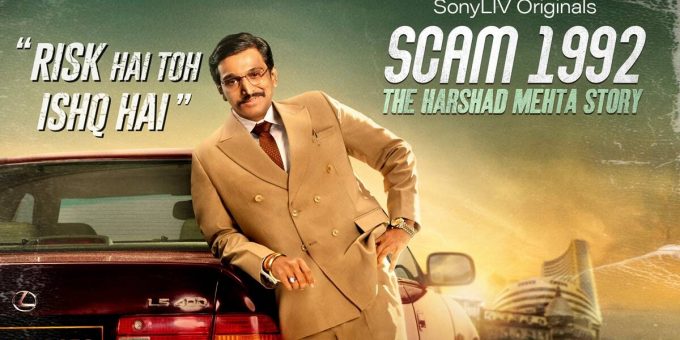
|
Updated: October 10, 2020 4:23:02 pm
Scam 1992: The Story of Harshad Mehta is streaming on SonyLIV.
Money is what makes the world go round, they say. It certainly made Harshad Shantilal Mehta tick. Those who lived through the late 80s and early 90s will recall the meteoric rise and rise of the man who came to be known as The Big Bull, labelled thus because he began the bull run of the stock market in 1991, which ended in a massive crash. Thousands of people lost all their money. Many became bankrupt. Some prominent citizens lost their lives, and reputations. And Mehta became the most wanted man in India.
Scam 1992: The Harshad Mehta Story is a fascinating account of a man who started small, and within an incredibly short period, amassed the kind of staggering fortune most people only dream of. The web series, which lasts an expansive ten episodes, is not just a detailed sketch of Mehta and his distinctly dodgy ways and his close cohorts, it’s also a portrait of an India which was on the verge of momentous change. Liberalisation was sweeping away the strangleholds of the license raj. Change was coming, but there were gaps between the creaky old ways of doing things, and the new ways: Mehta found those gaps, dug deep into them, and turned the system inside out.
The series is based on the book The Scam: Who Won, Who Lost, Who Got Away by financial journalists Sucheta Dalal and Debashish Basu. It opens with Dalal, played by Shreya Dhanwanthary, getting a tip from a harried SBI official about a ‘ghotala’ involving Rs 500 crore. Both the vastness of the sum, and the twitching anxiety on the man’s (Sharib Hashmi) face sets Dalal and her partner Debashish on the trail of the story which blew the lid off the biggest scam of the time, unravelling the unholy nexus between banks, both Indian and foreign, financial institutions, senior functionaries in the government, and powerful godmen. Was it Chandraswami, the saffron-clad mover and shaker who could shake governments at the time? The serial doesn’t name him, but it looks very much like him.
My eyes glaze over when they hear the word ‘the market’, but I have to say that Scam 1992 hooked me, kept me that way throughout, even though some parts felt a trifle stretched and loose. The writing is terrific, and the re-creation of that era and its people authentic. The Mehtas are not Gujaratis who speak as if they are in a kitchen-sink TV serial; Harshad and his brother, their wives, and their mother feel like a traditional joint-family who’ve never forgotten their roots even when they move from their modest suburban Kandivili dwelling to their shiny penthouse in Worli, with a swimming pool on the terrace that looks out to the Arabian sea, and a fleet of luxury cars in the parking lot. The parts when Mehta is learning the ropes of the market also feel real; the only place where it doesn’t feel quite as lived-in, is when it moves into the newspaper office and the area of news-gathering: somehow that’s a set, as it almost always is in a filmed version, in the way the stock exchange never is.
We get, for example, that Dalal is an impassioned journalist, completely convinced about the veracity of her story, but would she have responded quite as abrasively to an editor? (The bits featuring the legendary R Laxman wandering about the Times building are a delight, though). You wouldn’t even have noticed these very minor things in any other series, precisely because they are so minor, but they show up in contrast only because the rest of it is so spot on.
Dhanwanthary is believable. As is the actor playing Basu. There are other excellent casting choices. K K Raina as the complicit bankman, Nikhil Dwivedi as the smooth-talking ‘foreign’ banker who hates the brash Mehta’s guts, calling him a ‘b—y paanwala’, Satish Kaushik as the old-style uncouth moneybags who owns the floor, Rajat Kapoor as the CBI officer who curses as fluently as he uses his fists, and many others. But the series never strays too far from Mehta, the rag-to-riches broker who aroused equal doses of envy and admiration amongst his fans and detractors alike, and is played with absolute conviction by Pratik Gandhi.
The series starts in the 80s, and takes us till 2000, and we see Gandhi growing older, his face lined, his hair grey. But his attitude never changes: he is the ‘Amitabh Bachchan’ of the stock market, and as he likes to say, ‘Harshad ka raj ma, toh market majaa ma’. Bachchan’s name crops up at frequent intervals, clearly drawing our attention to the fact that if one were a screen superhero, the other was the hero of the common man.
The Hansal Mehta directed series (Jay Mehta gets a co-direction credit) does a smart balancing act, never quite tipping over into Harshad adulation, nor showing him as an unmitigated villain. What we get is a full-bodied, fully fleshed-out, complex individual, so much a man of his time and place and circumstance and skills, and just for that this series is a winner.
If you ask them straight-up, people who were covering the Harshad Mehta story at the time will stop short of calling him a crook (which he plainly was: what else do you call someone who bends all the rules, and does clearly illegal stuff to line his own coffers?). What they will say is that he was a smart man who did what he could to fulfil his dreams, while managing to convince himself and the pliant men who should have known better, as well as those who had their eye on the main chance, that what he was doing wasn’t exactly wrong, it was just taking advantage of the loopholes of the system, which anyway needed an overhaul.
A prestigious business magazine cover at the height of Mehta’s seemingly unstoppable run of the market, called him ‘The Raging Bull’. The accompanying story sounded as dazzled by him as was the general ‘junta’. What everyone forgot that a rise always comes before a mighty fall. And finally, that’s what it was, a cautionary tale: greed is not always good.
? The Indian Express is now on Telegram. Click here to join our channel (@indianexpress) and stay updated with the latest headlines
For all the latest Entertainment News, download Indian Express App.
© IE Online Media Services Pvt Ltd













